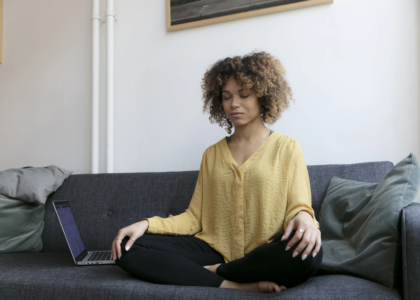How to Sleep Better: 9 Proven Tips for Managing Insomnia Effectively
Insomnia is a sleep disorder that affects millions of people worldwide. Whether it is trouble falling asleep, waking up multiple times during the night, or feeling unrested upon waking, the effects of insomnia can be physically and mentally draining. If you have ever tossed and turned for hours or found yourself staring at the ceiling while everyone else sleeps soundly, you know how frustrating and exhausting it can be. Besides that, the other consequences of insomnia are not merely feeling tired. It can interfere with your mood, productivity, and quality of life.
Good news is that you don’t need to suffer eternally because there are multiple effective strategies available to manage your insomnia and thus improve your quality of sleep. You don’t need a magic pill or some miracle cure: simple lifestyle adjustments and healthy habits during sleep can help you. By addressing both the physical and mental aspects of sleep, you will be able to create an environment that is restful enough for your body to get deep, restorative sleep.
Recognition of your sleep-inhibiting habits and contributing factors may initiate improved nighttime rest. Consistency in a bedtime routine, changes in your sleeping environment, and regulation of stress factors set you on your way toward getting more effective rest. Often it’s those slight alterations to one’s everyday behaviors that dramatically alter how a person sleeps as well as feels at the start of a waking cycle.
In this post, we’ll explore 9 actionable tips for managing insomnia and achieving better sleep. These tips range from creating a relaxing bedtime routine to limiting screen time and seeking professional help when necessary, all in the hopes that you can get control back over your sleep and wake up feeling refreshed. So, let’s dive into the steps you can take to overcome insomnia and sleep better tonight.
What is Insomnia?
Insomnia is a sleep disorder that affects millions of people worldwide, causing difficulty falling asleep, staying asleep, or waking up too early and struggling to get back to sleep. Unlike occasional sleeplessness, insomnia can last for weeks or even months, and it often leads to daytime fatigue, irritability, difficulty concentrating, and overall reduced quality of life.
The two major categories of insomnia are acute and chronic. Acute insomnia is short-term, and usually the cause can be stress or some form of a temporary change in routine. Chronic insomnia, on the other hand, is the condition where sleeplessness lasts for at least three times a week over a period of three months or more. Its causes are very diverse and can range from health problems to certain medications, poor sleep hygiene, or psychological conditions such as anxiety or depression.
The effects of insomnia go far beyond just tiredness. It is essential to have sleep in order to feel physically and mentally well, and chronic lack of sleep can result in long-term health problems such as weakened immune function, an increased risk of heart disease, and mental health problems. The most important thing about finding the right treatment for insomnia is identifying the cause.
Fortunately, insomnia can be managed and treated with lifestyle changes, cognitive-behavioral therapy for insomnia (CBT-I), and in some cases, medication. Simple steps like creating a consistent sleep schedule, practicing relaxation techniques, and managing stress can help improve sleep quality and make a significant difference in managing insomnia.
Common Causes of Insomnia
Here are some common causes of insomnia:
1. Stress and Anxiety
Stress due to work, school, relationships, or other life events can impact sleep considerably. The brain might be very active at night, and a person may not relax enough to sleep.
2. Depression and Mental Health Disorders
Mood disorders, including depression, are common accompaniments of insomnia. Sadness, hopelessness, or excessive worry may lead to a pattern of disturbed sleep and poor sleep quality.
3. Sleep Habits
Poor sleep timing, inconsistent sleeping hours, or exposure to excessive amount of screens during bedtime can result in an unbalanced circadian rhythm that might lead to insomnia.
4. Caffeine, Alcohol, and Nicotine
These substances are stimulants that interfere with falling asleep. The brain will continue to be stimulated by caffeine and nicotine, but alcohol makes a person drowsy at first but causes problems when it’s near the time when one should fall asleep.
5. Chronic Pain or Illness
Other conditions like arthritis, fibromyalgia, back pain, or restless leg syndrome can bring discomfort that keeps a person from sleeping soundly, making it difficult to fall asleep and stay asleep at night.
6. Chronic Pain or Illness
Other medications, like antidepressants, blood pressure medication, and even stimulants, can produce side effects that can interfere with sleep. Prescription, over-the-counter, and recreational drugs can also induce insomnia.
7. Hormonal Changes
Hormonal cycles, such as during pregnancies, menopause, or menstruation, cause most sleep disorders. Hormones may regulate the thermoregulation in the human body, mood swings, and amounts of energy; all such factors influence the quality of sleep.
8. Environmental Factors
Noise, light, temperature, and an uncomfortable mattress or pillow can interfere with sleep. Environmental stressors in a bedroom, such as noisy neighbors or an unfeathered bed, may deter a good night’s rest.
9. Jet Lag or Shift Work
Traveling across time zones or having to work odd shifts can also cause temporary disruptions in your circadian rhythm and lead to temporary insomnia. Short-term, but often difficult to treat.
10. Age-Related Factors
As individuals age, it is common for their sleep patterns to change. Older adults tend to have lighter sleep, wake more frequently, and must get up at night more often, which may contribute to the development of insomnia.
9 Tips for Managing Insomnia
Insomnia is a common sleep disorder that affects millions of people worldwide. Whether it’s difficulty falling asleep, staying asleep, or waking up too early, insomnia can leave you feeling exhausted, irritable, and less productive. The good news is that there are effective strategies to help manage insomnia and improve your sleep quality. If you’re struggling with sleepless nights, try incorporating these 9 tips to sleep better and finally get the rest you deserve.
1. Develop a Routine Sleep Schedule
One of the most effective ways to improve sleep is to establish a consistent sleep routine. Go to bed and wake up at the same time every day, even on weekends. This helps regulate your body’s internal clock, making it easier to fall asleep and wake up naturally. Over time, a regular sleep schedule can train your body to fall asleep more quickly and stay asleep longer.
2. Develop a Calming Bedtime Routine
A calming bedtime routine tells your brain it is time to wind down and prepare for sleep. Some activities include reading, deep breathing, or listening to soothing music. Avoid stimulating activities, such as checking your phone or watching television, which can make it difficult to fall asleep.
3. Limit Exposure to Screens Before Bed
The blue light of smartphones, tablets, and computers suppresses the production of melatonin, which is the hormone that regulates sleep. Limit screen time at least an hour before bed to enhance your chances of falling asleep. Instead, opt for relaxing activities, such as reading a book or taking a warm bath.
4. Prepare a Comfortable Sleep Environment
Your sleep environment is a significant factor in the quality of your sleep. Make your bedroom as comfortable and conducive to rest as possible. Keep the room cool, dark, and quiet. Invest in a comfortable mattress and pillows, and consider using blackout curtains or white noise machines to block out distractions.
5. Limit Caffeine and Alcohol Intake
Caffeine and alcohol are sleep disruptors. Caffeine is a stimulant, and it may keep you awake for hours, while alcohol might make you feel drowsy but interfere with the quality of your sleep. Limit caffeine in the afternoon and evening, and avoid alcohol close to bedtime if you want to sleep better.
6. Exercise Regularly
Regular physical activity will help you sleep better because it promotes relaxation and reduces anxiety. It is recommended that you do at least 30 minutes of moderate exercise most days of the week. However, vigorous exercise too close to bedtime has the opposite effect and makes it harder to fall asleep.
7. Manage Stress and Anxiety
Stress and anxiety often cause insomnia. Find ways to deal with these feelings with relaxing exercises like mindfulness, meditation, or progressive muscle relaxation. Keeping a journal can cleanse your mind before bedtime. The more you deal with stress during the day, the easier it is to sleep at night.
8. Be Aware of Napping
While napping can be beneficial, long naps or naps taken too late in the day can interfere with your ability to fall asleep at night. If you need to nap, try to keep it brief (20-30 minutes) and avoid napping in the late afternoon or evening.
9. Seek Professional Help if Needed
If you’ve tried various strategies and still struggle with insomnia, it may be time to consult a healthcare professional. Chronic insomnia can sometimes be a symptom of underlying conditions such as anxiety, depression, or sleep apnea. A healthcare provider can help identify the root cause of your sleep issues and recommend appropriate treatments, such as cognitive behavioral therapy for insomnia (CBT-I) or medication.
Conclusion: Achieving Better Sleep Through Practical Tip
In conclusion, managing insomnia and improving sleep quality is not something that happens overnight, but it is absolutely possible with consistent effort. The 9 tips shared in this post will provide you with practical strategies that can help you overcome sleep difficulties and restore healthy sleep patterns. Some of the steps include establishing a consistent sleep schedule, creating a relaxing bedtime routine, and optimizing your sleep environment, all of which lead to long-term improvements. You can slowly train your body to fall asleep more easily and stay asleep longer by setting the stage for restful sleep each night.
In addition, lifestyle changes, such as managing stress, avoiding excessive intake of caffeine, and refraining from using electronic screens late at night, can be helpful in enhancing the quality of your sleep. Physical activity and other relaxation methods may be beneficial in promoting better sleep. However, professional help is recommended if you suffer from an underlying condition that may be contributing to your insomnia. Keep in mind that every person’s path to good sleep is unique, and you may need some time to discover what works best for you.
By incorporating these changes into your daily routine and being patient with the process, you can regain control over your sleep. Remember, though, that it takes a little consistency in improving sleep. Some nights will just be tougher than others, but with a bit of effort and dedication, you’ll make significant strides toward achieving restful, rejuvenating sleep that your body and mind need.
Better sleep is finally within reach. Whether you begin with small changes or seek professional advice when necessary, you can find effective solutions to manage insomnia and enjoy improved sleep quality. By following these 9 tips and remaining committed to your sleep health, you will be well on your way to waking up refreshed and energized, ready to take on each day with renewed vitality.





